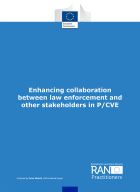Details
- Publication date
- 31 October 2023
- Author
- Directorate-General for Migration and Home Affairs
- RAN Publications Topic
- Community engagement/civil society
Description
Violent extremism is both a security issue and a social problem. Therefore, approaches to address violent extremism must be crafted to promote the inclusiveness of different societal elements and governmental levels. Addressing the impact of any form of extremism requires inclusiveness and multidisciplinarity with the involvement of many stakeholders, not only those of law enforcement and security but also from civil society and the community.
The Western Balkan (WB) countries, especially in the last decade, have faced and continue to face the threats of violent extremism and terrorism, be it ethno-nationalist or religiously motivated extremism with the tendency for right-wing extremism to grow. Internal governmental and civil society organisation (CSO) reports and research, international reports about the WBs such as European Commission progress reports for WB countries, as well as United States (US) Department of State country reports on terrorism, recognise progress and successes achieved in the field of preventing and countering violent extremism (P/CVE) such as the drafting of legislation, establishing of mechanisms or successes of law enforcement.
However, limited progress has been made in establishing a sustainable multi-agency approach to P/CVE. While WB countries have started to create a record of addressing P/CVE with inter-institutional mechanisms, including law enforcement agencies, segments of civil society and international stakeholders, interviews conducted for this paper demonstrate that this approach is still relatively new, as the general perceptions of policymakers and the P/CVE community were that violent extremism is still primarily a law enforcement and security issue.
The shift in the approach is especially visible in response to addressing the phenomenon of foreign terrorist fighters (FTFs) who travelled to Syria and Iraq. In 2014, with the support of the EU and the US, all WB countries adopted a more holistic approach including P/CVE and involving other relevant stakeholders such as civil society, NGOs and religious communities. Due to the international focus on P/CVE and the support dedicated to this area, WB countries have created dedicated mechanisms and policies.
However, it is unclear whether these mechanisms can become fully operational and sustained in the long term due to the following reasons:
- the rise of new challenges dealing with returning FTFs and their families diverting efforts from primary and secondary prevention to focus more on rehabilitation and reintegration (R&R),
- lack of coordination among central government and local stakeholders,
- lack of funding, allocation of resources and dependence on donor funds.

